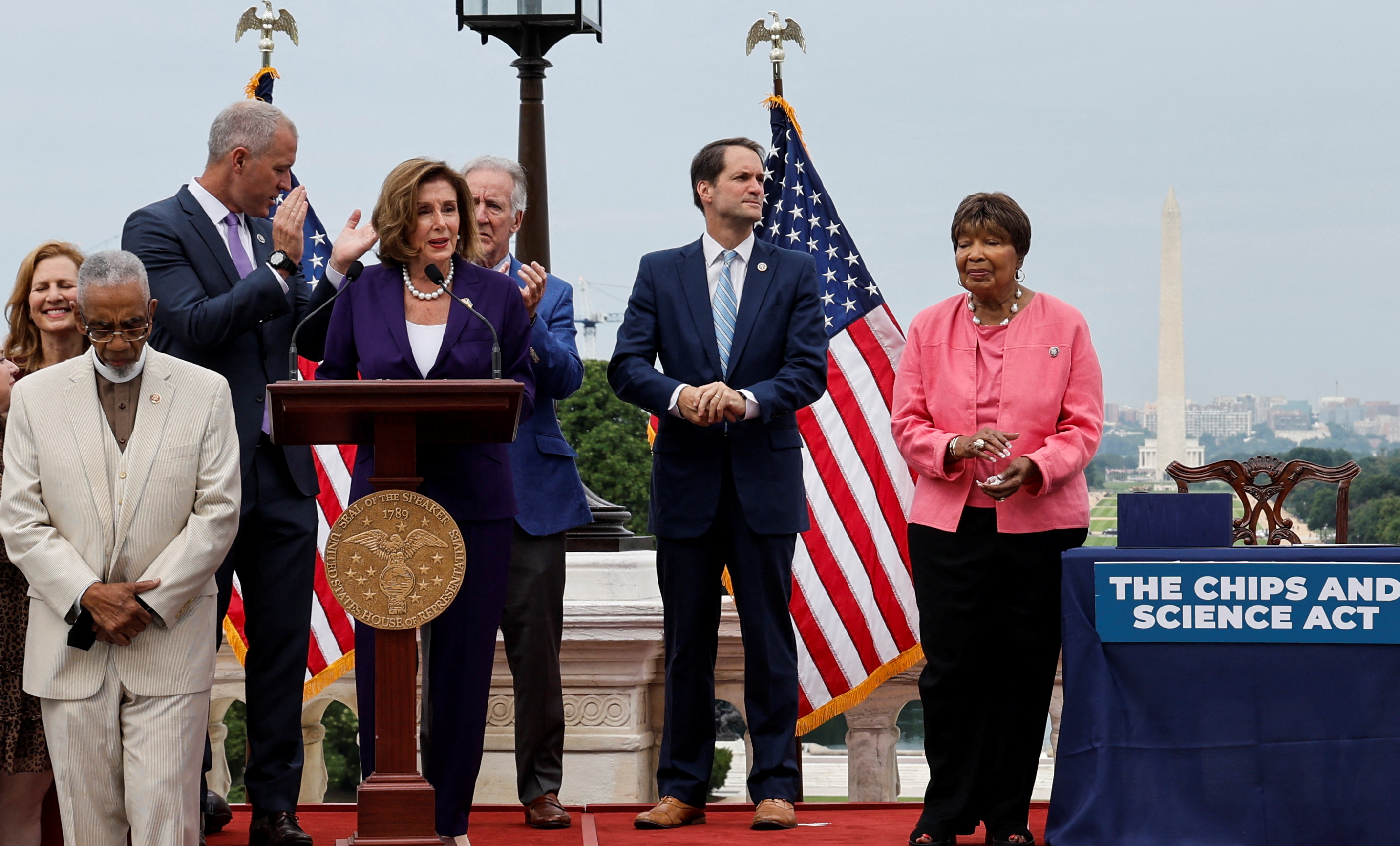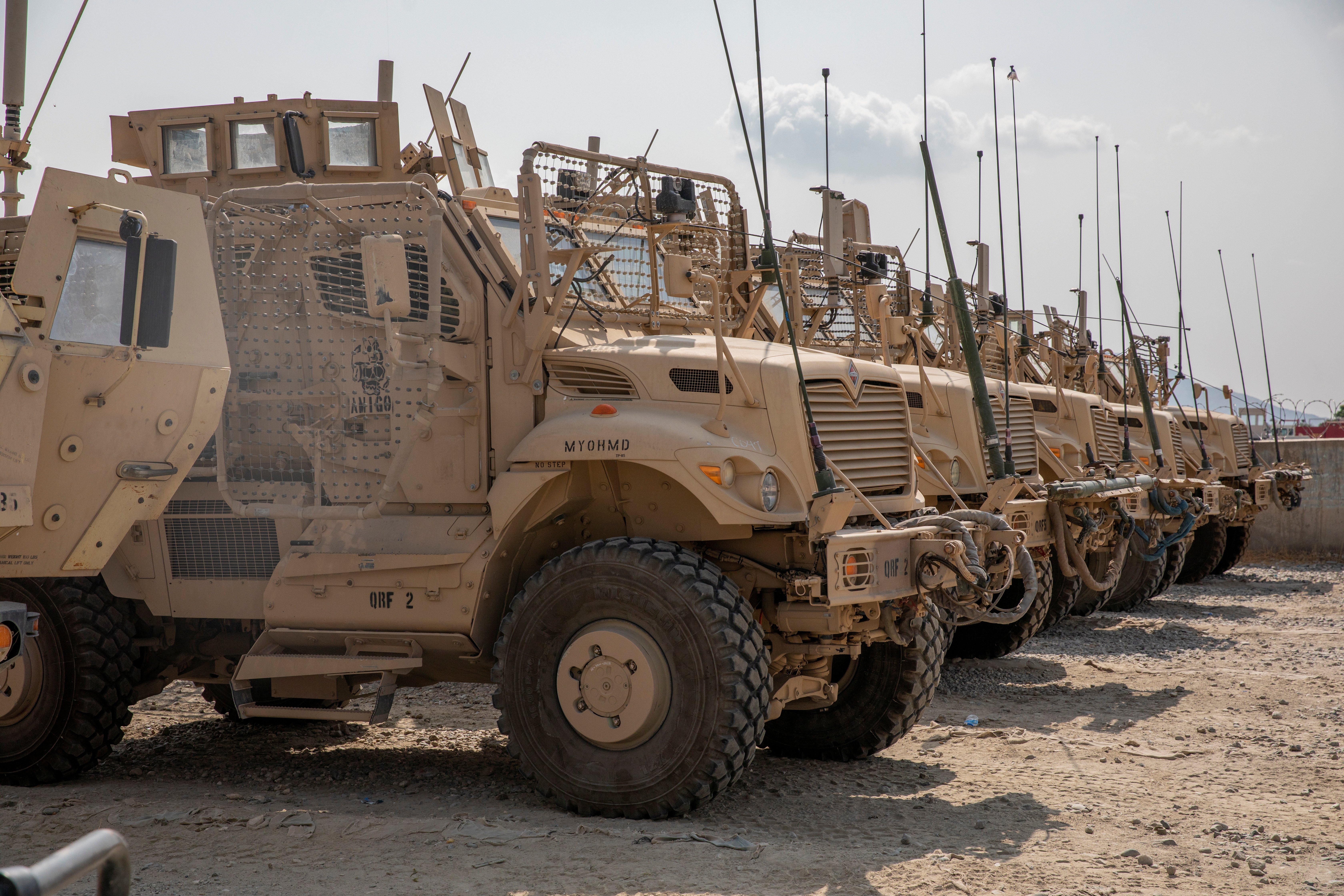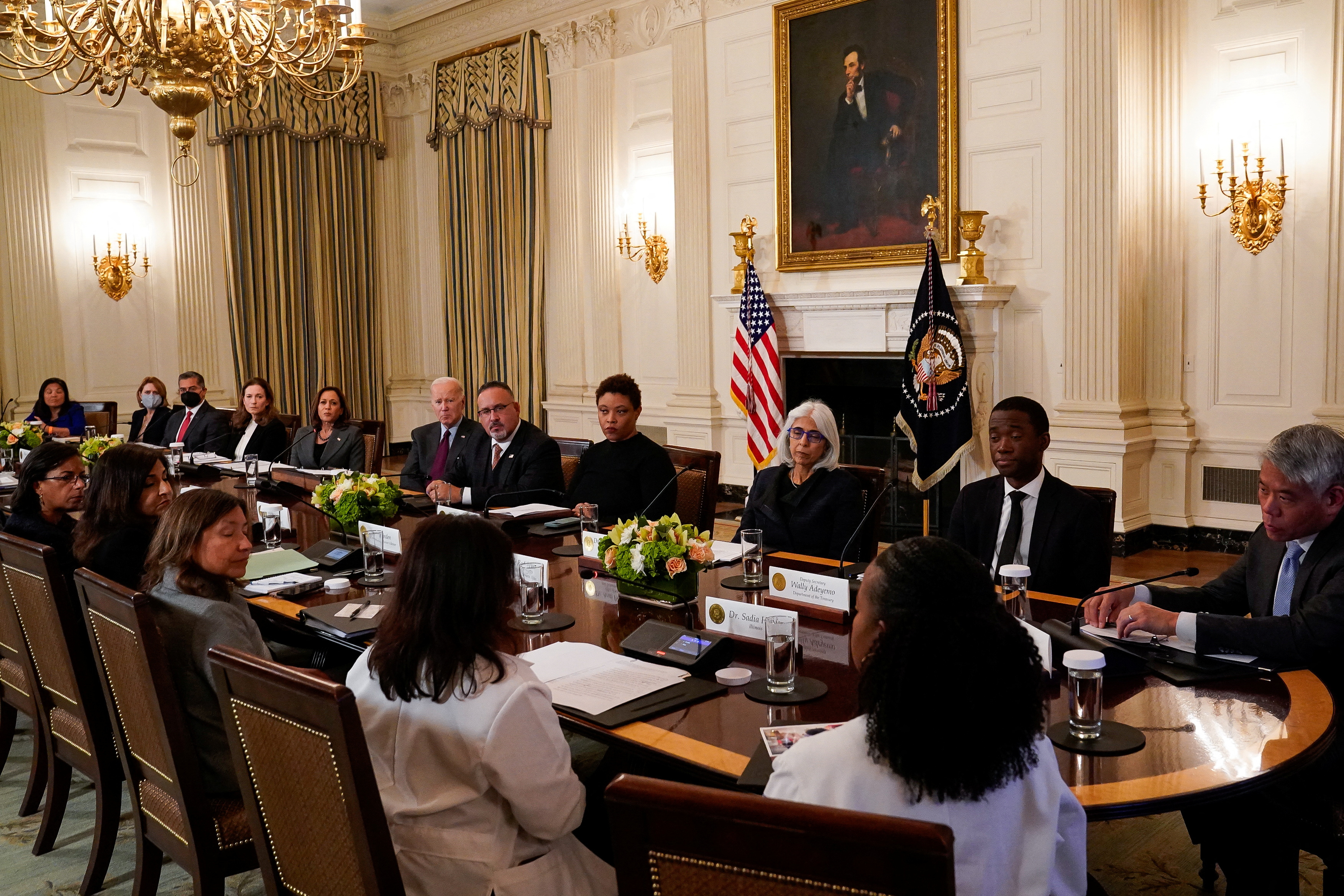
Two cheers for Biden’s national security record
Almost two years into his presidency, U.S. President Joe Biden’s hopes that his lifetime of foreign policy experience in Washington would make national security a natural political strength have encountered rough seas. After a reasonably good start in early 2021, his popularity took a nosedive that summer and has not really recovered, remaining around 40 percent or less ever since. The botched Afghanistan withdrawal and unseemly unveiling of the AUKUS deal took the sheen off his young presidency that year. COVID-19’s persistence, inflation’s return, and the Ukraine war have since taken a further toll. Most of the latter scourges may not have been his fault, but incumbents are rewarded or penalized for what happens on their watches, whether fair or not.
Twenty months into the Biden presidency, his team had not even released national security or national defense strategy documents — probably out of uncertainty about how to spin their vision and purpose amidst so many troubles. An interim national security strategy in early 2021 underscored several principles that would undergird Biden’s foreign policy — to include multilateralism, cooperation with allies (especially democratic allies), an emphasis on America’s middle class (translating in part into a reluctance to push a traditional free-trade agenda), and a focus on the new transnational threats like pandemic disease and climate change, as well as traditional military challenges. The public summary of his classified national defense strategy prioritizes China as the “pacing challenge” and Russia as the “acute threat.” But these limited pronouncements do not themselves add up to an integrated approach to the world. Moreover, some of these priorities are in clear tension with each other. For example, how can we successfully address climate and pandemic disease while treating China as an emergent adversary? And why is China the main problem if it is Russia that is violently challenging the global order more than any other power in 2022?
[Biden’s] national security record may not deserve three cheers, but it does merit two.
However, despite these mistakes and this inchoate grand strategy, Biden’s national security track record is better than widely perceived. (About 40 percent of Americans give him good grades, while more than 50 percent typically give him an unfavorable assessment in recent polls.) The reason is this: the country is still reasonably safe. That is the key metric by which to judge any grand strategy, and any president’s performance. Biden inherited a turbulent world in 2021; avoiding large-scale conflict in that world should count as a major accomplishment. Unlike his immediate predecessor, who took the nation closer to the brink of war against North Korea in 2017 than is commonly appreciated, and unlike certain prominent Republicans who have suggested the country consider recognizing Taiwan independence even at heightened risk of war with China, Biden has been calm and de-escalatory, yet resolute on core matters of national interest. His national security record may not deserve three cheers, but it does merit two.
Consider some of the big challenges that Biden and team have tackled to date:

UKRAINE AND RUSSIA
On the Ukraine conflict, the Biden team’s record is mostly good so far. Biden rightly decided that the United States should not directly enter the conflict and risk World War III over a part of Europe that, while important, is not vital to U.S. national interests. We take that decision for granted, but it remains enormously important, given the potential for escalation in any direct fight between nuclear-armed superpowers that involves a major interest of at least one of them. Biden did, however, help lead a Western response in the economic realm that has cut off most high-tech cooperation between the West and Russia (even if it has not yet substantially reduced Russian oil and gas export earnings or brought the economy to its knees).
In addition, Biden decided to provide massive security and economic assistance, and unprecedented intelligence support, to Ukraine in order to help its military forces and protect its government. As of this writing, Ukraine has received some 10,000 precision missiles (mostly Javelin and Stinger) from the United States, some 20 helicopters and a similar number of High Mobility Artillery Rocket Systems, hundreds of thousands of artillery shells, communications equipment, counter-battery radars, support vehicles — all in all, around $15 billion in weapons from the United States alone, as well as considerable intelligence support so that those weapons can be well employed, and lots of cash to keep the economy afloat. Meanwhile, NATO is united, and strengthening.
Creating an alternative security structure would have been difficult to do at the barrel of a gun, given Putin’s bullying brinkmanship.
The record is not unblemished. Biden could have tried harder to prevent the war. Much of the U.S. intelligence community and many top administration officials were convinced by late 2021 that Russia intended to attack, yet the reaction in Washington seemed fatalistic more than entrepreneurial, with Biden himself at one point in January of 2022 predicting that Putin “has to do something” given the magnitude of his military preparations. There were not the kind of overtures to the Russians that President John F. Kennedy undertook in the Cuban Missile Crisis, or Kissinger during the 1973 October War, for example (for the interested reader, one of my favorite books on this subject is McGeorge Bundy’s “Danger and Survival”). Without conceding core principles, the United States could have tried to discuss alternatives to eventual NATO membership for Ukraine with Moscow, provided that any such alternatives would impose verifiable obligations on Russia and not compromise Ukraine’s sovereignty. As former U.S. Ambassador to Russia (and current CIA director) Bill Burns has written, in his fine memoir “The Back Channel”, the history of NATO expansion — particularly the NATO proposal in 2008 to someday bring Ukraine and Georgia into the alliance, a vision reaffirmed in the U.S.-Ukraine charter of November 2021 — caused deep resentment in Putin’s vindictive and imperial mind. But creating an alternative security structure would have been difficult to do at the barrel of a gun, given Putin’s bullying brinkmanship, so I cannot fault Biden too strongly for the mistake.
We are of course far from done with this tragic conflict. The Biden team may need to lead the way in creating more intense economic pressure on Russia in the months and years ahead — and may need to look for some more creative diplomatic solutions or compromises that it could encourage Ukraine to consider in the future as well. So the record is of course incomplete. But its fundamentals are generally sound to date.

CHINA
On China, the Biden team risks overdoing it, in rhetoric, messaging, and diplomacy. It pits China as something close to an adversary, and accuses it of genocide — a loaded term if there ever was one. It designates China as America’s top national security challenge, even as Russia, not China, wages the most horrific war fought in Europe since 1945. U.S. Secretary of State Antony Blinken’s big foreign policy speech of March 2021 held out collaboration as one of the three pillars of the Biden administration’s China policy (along with competition and, when unavoidable, confrontation); his May 2022 China speech dropped the cooperation dimension. But on specific policies pertaining to China, the Biden administration decisions have been generally sound.
Biden has been right to keep some Trump-era tariffs on general trade with China, use the Committee on Foreign Investment in the United States to impede Chinese acquisitions of American high-tech jewels, and otherwise push back against Chinese economic theft. The latter of course has national security ramifications, since advanced commercial technology can have many military applications. In addition, the Pentagon has correctly described China as the “pacing challenge” and focused the Department of Defense’s long-term modernization and investment strategies on that country.
[Biden and Xi] have maintained a degree of cordiality and professionalism in their personal rapport that provides some strategic ballast in the broader relationship.
Biden’s frequent misstatements, if in fact they have been mistakes, about how he would authorize a U.S. response to any Chinese attack on Taiwan have probably been good for deterrence, even as White House staffers would always then walk back Biden’s words and reaffirm the longstanding policy of so-called “strategic ambiguity” about a possible U.S. military defense of Taiwan. Abandoning the latter in favor of “strategic clarity” would be a mistake for two reasons: it would inflame relations with Beijing, and it would promise a military protection of Taiwan that, depending on the scenario, the United States might not be capable of providing reliably. But U.S. Secretary of Defense Lloyd Austin’s concept of integrated deterrence, as well as the West’s collective response to the Ukraine invasion, signal strongly to Beijing that whether we intervened militarily or not, we would largely decouple economically from China in the event of a conflict. To be sure, such a process would necessarily be painstaking, gradual, and piecemeal — but it could also be sustained and expanded over time, just as we are now witnessing in regard to the West’s dealings with Russia. That integrated deterrence concept, plus Biden’s verbal gaffes, plus U.S. military modernization focused on China actually add up to a fairly strong deterrent posture.
Even as he shores up deterrence in these ways overall, Biden keeps talking to Chinese President Xi Jinping, through the thick and thin of U.S. Speaker of the House Nancy Pelosi’s, former U.S. Secretary of State Mike Pompeo’s, former U.S. Secretary of Defense Mark Esper’s, and U.S. Senator Edward Markey’s visits to Taiwan, among other events. The two men have maintained a degree of cordiality and professionalism in their personal rapport that provides some strategic ballast in the broader relationship — evidenced, for example, by the fact that Xi promised Biden in August 2022 that he was not seeking war over Taiwan, even as China carried out threatening military exercises following the Pelosi visit. Naming the extremely able, and calm, Nick Burns as U.S. ambassador to China helps further in this regard.

DEFENSE AND THE MILITARY
On American military strength, Biden has benefited from bipartisan support in Congress for a strong defense budget. That has allowed him to maintain or even improve high standards of military readiness, maintain an excellent all-volunteer military even in a COVID-19-stressed labor market, and create new bases as well as new forms of military presence in both the Pacific and Eastern Europe.
The nation is devoting more resources to military research, development, testing, and evaluation than ever before in its history.
The nation is devoting more resources to military research, development, testing, and evaluation (RDT&E) than ever before in its history (RDT&E is one of the four big areas of the Department of Defense budget, along with procurement, military personnel, and operations and maintenance). The resources are being used for traditional purposes, such as development of more advanced aircraft, submarines, and air and missile defense systems. But they are also being used to develop hypersonic weapons (one type for each of the three big military services), to employ artificial intelligence and other advanced digital capabilities more effectively in new weapons, to build smaller satellites for the new Space Force that are less vulnerable to enemy attack, to make the Marine Corps more maneuverable and deployable, to build uncrewed ships for the Navy, to provide the Army with tilt-rotor aircraft to replace slower helicopters, and to make communications systems more resilient and survivable. Most of these RDT&E programs will typically make the transition to procurement later in the decade.
Again, the record isn’t perfect. There is inadequate sense of urgency about buying the munitions needed to replenish those we are sending Ukraine (munitions still aren’t sexy for most four-stars), and about finding ways to station munitions and sensors in the Western Pacific region to deter a Chinese invasion attempt against Taiwan. We, and Taiwan, still depend too much on large fixed bases and large visible aircraft carriers to prevent such an amphibious assault. So there remains ample room for improvement.

INFRASTRUCTURE, RESILIENCE, AND ECONOMICS
Despite having to settle for a very modest or “super-skinny” version of his Build Back Better agenda as reflected in the so-called Inflation Reduction Act of 2022, Biden has in fact achieved at least two major domestic achievements that have national security ramifications.
The first was the bipartisan infrastructure bill of 2021, the Infrastructure Investment and Jobs Act. It was passed amidst a sea of headlines about how the Build Back Better agenda was not succeeding in Congress as hoped or expected. But the infrastructure bill did pass, and it provides an important way for the country to give a sustainable boost to elements of its domestic and economic power that are relevant to military strength, given what they do to bolster GDP. Several Brookings scholars consider it quite substantial in scale and likely impact.
The second achievement was the big bill of summer 2022 — the CHIPS and Science Act — funding semiconductor factories and scientific research. It will reduce the nation’s dependence on key high-tech goods from East Asia and strengthen the nation’s underlying science and technology base.
Biden has not been able to reduce the partisan discord over politics, Donald Trump, and elections.
The nation’s economic foundations are crucial to its long-term strength, domestic cohesion, and military power. Its high-tech sectors are also crucial to defense innovation. As such, these bills are important not only in their own immediate right but as part of a larger national-security strategy for the country. Over the longer term, the semiconductor and science law in particular may help produce technologies that help us address other serious 21st century threats as well — threats not just to the United States and its allies but to Latin America, Africa, the Middle East, South Asia, and other regions — to include climate change, pandemic disease, and cyber dangers.
More broadly on the domestic front, Biden has not been able to reduce the partisan discord over politics, Donald Trump, and elections. The country is still in serious trouble on such fronts. But it is hard to blame Biden himself too much for that. Still, in this general vein, he and other national leaders will need to give continued serious attention, imagination, and resource allocation to the country’s serious internal challenges. They range from an economically imperiled middle class to mental health care trends to gun and traffic dangers to opioid addiction and other health care dilemmas. These serious and often growing problems collectively pose serious threats to the nation’s ability to function effectively as a polity — and as such, beyond their implications for the well-being of many individual Americans, constitute a major national security challenge as well.

MISTAKES AND FAILURES
To be sure, there have been big mistakes, as well as failures of imagination and creativity.
The Afghanistan decision was indeed an unforced error. Pulling out on four months’ notice left the Afghan government with inadequate time to develop a military triage plan or figure out how to keep its U.S.-provided planes flying without American contractor support. The impressive achievement of getting more than 100,000 Americans and U.S. friends out of Afghanistan by the end of August 2021 was severely tainted by the fact that we left many friends behind, and that 13 Americans died in a tragic attack in Kabul on August 26. Although the rapid Taliban takeover of the country spared the country a massive bloodbath, the ineptitude and extremism of the Taliban government have led to a situation in which the World Food Program estimates that roughly half Afghanistan’s population of 40 million is at risk of famine, and almost 20 percent at extreme risk. The killing of al-Qaida leader Ayman al-Zawahiri by a U.S. drone after American intelligence located him in a Kabul “safe house” in July 2022 suggested that “over the horizon” counterterrorism is not completely impossible against a known target. But his very presence in a house belonging to the Haqqani network suggests that there may be future collaboration between the Taliban and al-Qaida. All of this to end a U.S. military presence that had already been downsized more than 95% from peak by the time Biden took office, and to honor a 2020 agreement with the Taliban that the latter had already violated multiple times over.
The main consequence of the withdrawal is a humanitarian one, the well-being of the Afghan people.
Still, any fair assessment of the Biden national security record must place the Afghanistan debacle in geostrategic perspective. That country is of limited global import compared with many others. To date, the main consequence of the withdrawal is a humanitarian one, the well-being of the Afghan people. That assessment could change if al-Qaida or ISIS launches a big attack on the West from Afghanistan, but to date the likelihood of such a tragedy seems fairly low.
There are other problems with the administration’s foreign policy too, naturally. Notably, if Afghanistan was a sin of commission, North Korea policy is one of omission. The Biden team seems strangely passive on dealing with Pyongyang. They are content to tell Kim Jong Un that we will negotiate anytime he wishes, but to leave the content of any such possible talks a mystery. Instead, Biden or his secretary of state or national security advisor should propose a halfway deal with Kim Jong Un — an agreement that would cap the size of his nuclear arsenal (by verifiably dismantling nuclear production facilities) while instituting bans on nuclear and long-range missile testing, all in exchange for a partial lifting of sanctions. The prospects for a deal are probably better here than with Iran, given the tight time horizons associated with the Joint Comprehensive Plan of Action (whose provisions and restrictions on Iranian nuclear activity start to loosen as early as next year) and the deep partisan discord surrounding that 2015 accord. Yet the administration is giving far more time and attention to Iran. If anything it should reverse its priorities and make a greater effort towards North Korea.
A bigger idea for Latin America should be a top priority, too. Traditionally, this region is not seen as a top U.S. national security concern, largely because it does not pose a classic military challenge. However, the witches’ brew of illegal narcotics flows, immigration challenges, and weak economic performance as well as law enforcement performance of several countries to America’s south has contributed to a staggeringly deadly opioid epidemic in America — as well as a top-tier source of political discord in the nation. Especially in light of the administration’s uneven performance on helping developing countries confront the COVID epidemic, Biden needs a signature initiative analogous in scope and scale to George W. Bush’s PEPFAR effort against AIDS. Latin America seems the right place to make the try.

HOW TO IMPROVE FUTURE ADMINISTRATION PERFORMANCE
Where Biden has gone wrong, it is worth trying to understand why. Only with such an understanding can the administration perhaps rethink some of its existing practices and methods, and the rest of us try to apply political and intellectual pressure to encourage a shift in approach. Biden should keep his “resolute restraint” — being firm on defending allies and core interests without looking for war or succumbing to escalatory pressures when crises arise. His desire to avoid escalation and war during crisis is commendable. He should, however, be more strategic on some key issues, carefully weighing costs and risks while prioritizing big issues over smaller ones, and perhaps not trusting his instincts quite so much, as he may have done to a fault on Afghanistan, North Korea, NATO expansion, and even aspects of COVID response.
Where Biden has gone wrong, it is worth trying to understand why.
The Biden national security team appears to do well at the classic Democratic Party thing: understanding, considering, and ultimately reflecting the views of a wide array of interest groups. There’s a seat at the table for democracy promoters, human rights champions, American-middle-class advocates, alliance repairmen, and other multilateralists/globalists, domestic politics specialists, China bashers, NATO expanders, defense hawks, defense moderates, regional experts, and grand strategists. Not to mention those fixated on the 21st century transnational challenges: climate, cyber, pandemic disease. Not to mention experts on domestic politics and horse trading.
For the most part this is as it should be. But sometimes policy seems designed primarily to satisfy just one or two of these concerns or groups — and grand strategy takes a back seat. Every foreign policy team has its strengths and weaknesses, of course. In Biden’s case, he built a team of individuals with high integrity, excellent work ethics, and considerable intelligence. But it is probably fair to say that he did not build a team of rivals made up of strong-willed individuals with their own powerful views on strategy. As such, there is a risk that policy process triumphs over robust debate in the Situation Room, and that sometimes a decision is based either on Biden’s instincts or on the particular druthers of a given interest group. In short, the administration still needs to be more strategic — more reflective about how different priorities affect each other.
A good specific example is continuing to call the Chinese treatment of the Uyghurs genocide, (reiterating what Pompeo said in late 2020). That is a hugely loaded and incendiary term and not correct except in the most technocratic legal sense. It adds insult to injury at a time when we cannot afford needless provocation of China. To be sure, China’s repression of the Uyghurs should be documented and penalized, and the recent U.N. report had the right tone on this. The problem in U.S. policy was in letting the lawyers and human rights purists and China bashers carry the day with the term genocide.
Another example is North Korea policy, where there seems to be no creativity in diplomacy, perhaps partly out of fear that attempting to talk to Kim would open the Biden team to political attack. The domestic political team and the nuclear nonproliferation purists seem to have won this one, again at the expense of broader and more holistic national interests.
A third example was the reckless reiteration of our goal of bringing Ukraine into NATO last November, when a U.S.-Ukraine strategic charter was signed. Most Americans didn’t notice that document; Russian President Vladimir Putin surely did. I do not mean to blame the United States or Biden for the Ukraine war morally. But the bipartisan idea dating back to George W. Bush that Ukraine belonged in NATO someday was always flawed. On this one, we let an ideology of democracy promotion and alliance expansion lead us to unwise choices, dating back to 2008. And reiterating our goal so publicly and prominently in 2021 was unwise, especially since we had no real intent of acting on our words.
Still, the Biden record holds up reasonably well. The core job of any American president on the national security front is to keep the world as safe and stable as possible so that the nation will be secure. Biden deserves no Nobel Prizes yet for solving any of the key overseas challenges that make today’s international environment very dangerous. And he has made plenty of mistakes. But focusing on the big picture and the fundamentals — especially China and Russia, especially defense policy and national economic and scientific strength — it has not been a bad first two years so far.
Acknowledgments
Editorial: Alex Dimsdale
Web layout: Rachel Slattery
